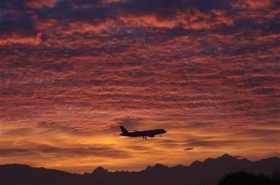 The Obama administration is laying the groundwork for possible retaliation in response to a European law requiring airlines to pay for carbon emissions.
The Obama administration is laying the groundwork for possible retaliation in response to a European law requiring airlines to pay for carbon emissions.
Discussions between key agencies have ramped up recently, although there is no consensus yet on what, if anything, the U.S. government should do unilaterally or in concert with other nations also upset with the law.
The EU law went into effect on January 1 and requires global airlines to pay for carbon emissions on flights to and from Europe.
Several experts said one option the United States could pursue would involve charging European airlines to maintain U.S. access to pressure EU policymakers. This strategy was used by the United States in a recently concluded dispute with Argentina over landing fees.
“We are contemplating a wide range of possible steps that we could take, or actions that we might take,” a senior administration official told Reuters.
“All these are on the table, we haven’t decided how to move forward on any specific one,” the official said, while declining to give specifics on the possible steps.
U.S. airlines, some of which have already raised fares to offset the EU carbon trading scheme, expect a formal response from the Obama administration.
“We take the White House at their word that they are prepared to take action, which could include a country-to-country legal action, retaliatory measures or any number of steps to urge the withdrawal of the EU’s unilateral scheme in favor of a global approach,” said Steve Lott, a spokesman for the U.S. industry’s leading trade group, Airlines for America.
The State and Transportation departments warned the European Union in December that the administration was prepared to “respond appropriately” if the EU did not reconsider the measure or seek a negotiated settlement through the United Nations.
Neither occurred before the law took effect, prompting outcry from airlines globally. Carriers said the change amounted to a new tax at a time when they are wrestling with historically high fuel costs and softening demand in domestic flights, especially in the United States.
Source : Reuters





































